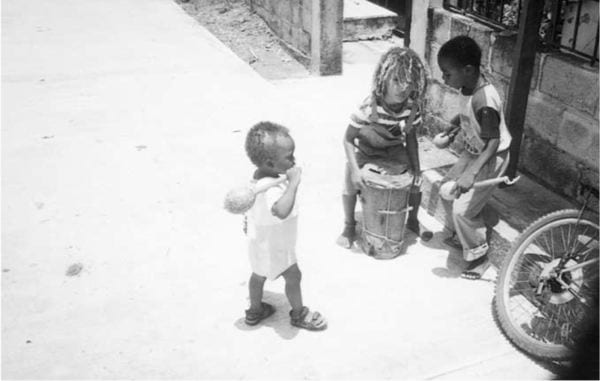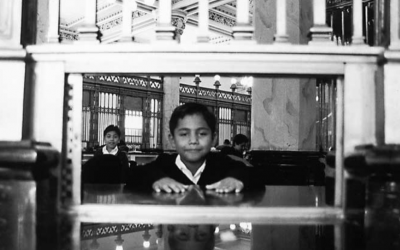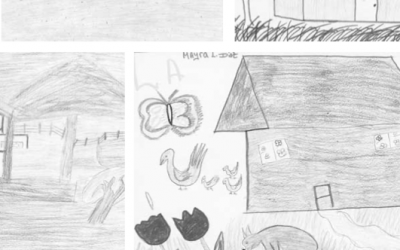Changing the Untenable
Choices Families Face

Children play on a street in Livingston, Guatemala. Photo by Michael Rosenburg.
Humberto started to pace back and forth across the floor of the cinder block home, cradling his son in his arms. There had to be a story. In the slum, no one had enough money to stay home voluntarily. For most men, there was an awkwardness when they held an infant; infant care remained gendered women’s work. Humberto had clearly been caring for his son for months.
Humberto (whose name, as well as others in this article, has been changed to protect confidentiality) started in the middle of the story. His son, Humbertito, or little Humberto, had been named after him. Pneumonia had struck Humbertito as an infant. Two million children under the age of five in developing countries died from acute respiratory infection in 2000. Humberto and his wife, Julia, brought their only child to the hospital. But you could not leave your child as you might in a hospital in New York or Geneva and expect that nurses, attendants and physicians would meet his or her needs. Like poorly-funded hospitals in much of the developing world, the public hospital where they sought help relied on family members to provide much of the care. Humberto and Julia—like every other parent—had to be there to make sure their children ate, received medicine, had diapers changed and received every aspect of basic care. The hospitals simply did not have the staff.
Humberto and Julia had to take turns missing days of work at their factory jobs to care for their son. The first day Humberto was absent, his supervisor told him he had to return the next day. The second day Humberto missed work, his supervisor told him not to bother to return. The third day Humberto missed work, he was fired.
When Humbertito recovered from pneumonia, his father walked from one factory to the next looking for work. However, it rapidly became clear he’d been blacklisted. At every door he knocked on, he was told there were no jobs. Frequently people who came after him received work.
But the story of the connections between labor conditions, children’s health, and family welfare began earlier. The working conditions that Julia faced were the beginning of the story. Julia had to return to her factory job 42 days after Humbertito’s birth or be fired. The milk in her breasts dried up. With her long work hours, there was no way to breastfeed or pump milk during the day. Around the world, the basic biology of breastfeeding provides essential immunity to infants, assisting in fighting off infections that are dangerous in the first year of life. The economics of infant formula and clean water mean that breastfeeding plays a particularly critical role for poor families in developing countries. Without breast milk, infants in these families too often end up severely malnourished because of the inaccessibly high cost of formula and the unavailability of clean drinking water. Fed too little powdered formula mixed with water filled with pathogens and pollutants, the infants become sick with gastrointestinal and respiratory illnesses. It’s double jeopardy because they do not have the protection of the immunoglobulins found in breast milk. Julia had no choice except to return to work right away. She was unable to continue to breastfeed for any length of time. Humbertito suffered first with diarrhea, then with pneumonia.
The problems families confront stem from the lack of essential services for their children as well as the working conditions parents face. In the same Honduran city where Humberto lived, there was a shelter for families displaced by a hurricane and mudslides two years earlier. Past the barracks with still-homeless families, a small boy, his black jeans several sizes too big at the waist and too long, leaned against a metal pole as he stood watching people washing clothes in the communal sinks. Ten years old, Ramón walked the 30 feet from where he stood to the one room shelter shared by eight members of his family. When he got to the open door, three of his younger sisters swarmed around him, delighted to see him back. His parents couldn’t afford childcare while they worked trying to earn enough money to rebuild a home. Ramón was responsible for Martita, who was five years old, Cari who was four years old, and three-year- old Justina. When he pointed to Laurita, who he said was more than one and less than two, she wasn’t readily visible. There appeared to be a doll sitting in a chair in the dark room, not a toddler. Her body was completely immobile. Further inside the dark room on a bed lay Beni, Ramón’s five month- old brother.
Laurita’s legs were thin as twigs, bent like those of children with rickets from malnutrition. Ramón explained that she never used her legs. He didn’t know how to get her out of the chair or to encourage her to walk. At five months, Beni was on his way to being equally malnourished. There was a bottle at home but Ramón didn’t know how to prepare it; only his 14-year-old brother Miguel did. But Miguel was nowhere to be found. All the children depended on Miguel to come home for them to have a meal. Ramón was tender with his siblings and as attentive as one could expect a 10-year-old to be. But no 10-year-old could care well for five children five-years-old and under. Ramón was about to start third grade. He had repeated the second because he had lost time when he had been asked by his mother and father to care for Justina, his three-year-old sister who had had convulsions as a result of high fevers. Justina’s teeth were rotted. They had the rot of bottle-mouth, a result of being left with a sweetened bottle in her mouth for hours on end with no one to supervise her.
Beni had a deep, penetrating cough. A bottle of medicine for Beni’s constant coughing sat on a shelf in the tidy room. The bottle was labeled clearly that Beni should receive the medicine three times a day, but there was no one to give it during the twelve hours that his parents were at work. Caring and concerned that an overdose might be deadly if Beni received too much, Ramón’s parents had given him clear and firm instructions never to give the medicine.
Ramón’s mother worked from six in the morning to six at night, six days a week. His father worked equally long hours trying to save something to rebuild the home destroyed by the hurricane. They clearly cared deeply about their children. But it was equally clear that when they needed to work long hours to meet basic needs, when they lacked child care so their preschool children were in the care of a 10-year-old boy, the health, basic development, and education of their children were all endangered.
Humberto and Ramón were interviewed in the context of the Project on Global Working Families (PGWF), a program that I (Jody Heymann) founded and lead at the Harvard School of Public Health. PGWF is the first program devoted to understanding and improving the relationship between working conditions and family health and well-being throughout the world. As part of this effort, our research team has conducted four types of studies to date. First, we have mapped forty years of demographic trends related to labor and families in more than a hundred countries. Second, we have conducted in-depth interviews of nearly a thousand parents in six countries around the world including Mexico, Honduras, Botswana, Vietnam, Russia and the United States. Third, we have conducted statistical analyses on large national household surveys from Brazil, Mexico, Botswana, Russia, South Africa, Vietnam, and the United States. Fourth, we have begun new large-scale studies on special topics. In fact, our most recent initiative, started this year, will conduct a household survey in different Mexican communities to measure the impact of international migration on the health and development of the family members that stay behind. Finally, we are currently examining public policies from more than a hundred countries, including Latin America in its entirety, regarding the conditions working poor families face.
FINDINGS: CHILDREN AND FAMILIES AT RISK
In every country where we have conducted in-depth studies, children are being left home alone. Thirty-seven percent of parents in Mexico found themselves having to leave their children home alone some or all of the time they worked, as did 21% in Vietnam and 50% in Botswana. The experiences of preschool and young school age children home alone are often tragic. Dr. José Luis Castro, working in southern Mexico, told us in an interview that he remembered two cases where children left by themselves had suffered serious accidents. In one occasion, one child got very ill after drinking liquid detergent. Another child, left unsupervised at home, got severely burned. Similarly, Dr. Marcia Graciano, interviewed in northeastern Mexico, recalled a recent incident where a child had fallen from a cradle and suffered brain injuries, and he had been taken to the emergency room only after the parents got home.
Too often, parents’ only alternative to leaving very young children home alone is to leave them in the care of other children. In Mexico, 24% of the parents we interviewed had left their children in the care of other children, as had 34% of the parents in Botswana and 22% of the parents in Vietnam. A Mexican mother, Crista Robles, worked as a domestic servant while her six-year-old cared for her two-year-old.
My son, who is two, had just left with his older sister, the one who is six years old… She didn’t go [to school] today, because I told her to stay home. Because if she didn’t, where would I leave my son? . . . Sometimes they tell me, ‘Mamita, don’t work anymore, because we don’t want to be alone.’ And I tell them, ‘But if I don’t work, we won’t be able to afford food.’
When children are left home alone or in the care of other young children, they are far more likely to be inadequately fed, become malnourished, be exposed to poor drinking water, get diarrhea or other infections or have serious accidents and injuries. At two years old or six, the children are simply too young to care for themselves or for each other. Six-year-olds don’t adequately feed their two-year-old siblings; they don’t feed them frequently enough, they are unable to prepare the food young children need. They don’t know how to ensure that an infant eats enough. In countries where cooking requires fire, young children can rarely cook safely. Where clean running water does not exist in the household, obtaining it often requires traveling lengthy distances or boiling water. The consequences of using the more readily available unclean water are diarrhea and frequent infections. Accidents and injuries arise from young children being hit by cars when they are too young to reliably take precautions on the road, when they fall from heights when they are unsupervised, and when fires start when they try to cook.
In Mexico, nearly half (48%) of the parents we interviewed had had children experience accidents or emergencies while their parents were at work, as had 38% in Vietnam and 52% in Botswana.
When we interviewed Berta García, a laundress and restaurant worker, she told us that her two jobs were necessary to raise enough money to support her three children, but that while she was at work her children had to stay home alone. One day, she was contacted at work and notified that her 11-year-old middle child had fallen and hit his head. She went home and took her son to the doctor, only to find out that he had suffered a concussion and lost consciousness for several minutes.
Other times, families told us of tragedies involving fires when children tried to cook. Too often this resulted in children being severely injured or dying. In the same city where Ramón and Humberto lived, an older woman described rescuing one of her neighbor’s twins. At two years old, the twins had been locked in their house for safety (relative to wandering alone in the streets) while their parents went to work when they had no alternative source of care. No one knows how the fire started. All the neighbor knew is that she was able to rescue one, badly burned, but it was too late for the second twin.
When the parents we interviewed stayed home temporarily to care for their own children, all too often they lost pay, benefits, or jobs that were essential to feeding families. The simple act of caring for sick children led to lost pay, lost job promotions, or difficulty retaining jobs for 51% of parents in Mexico, 28% of parents we spoke with in Botswana and 63% in Vietnam. In one southern Mexican city, a mother reported not being allowed to leave work after receiving a report that her son had been bitten by a dog; another explained how she lost pay after taking her nine-month-old baby, sick with diarrhea, to the doctor one day; and a third one lamented that in her previous job—where she worked for ten years—her boss constantly warned her that if she ever missed work, regardless of the reason, she would get fired. Unfortunately, stories like these were recurrent.
MAKING A DIFFERENCE
We are taught at a young age to turn our gaze away from problems like these. We are taught they are unsolvable, even when solutions to the same problems exist for people who are closer to us. Don’t be fooled and don’t turn away.
We need to take two steps as a global community: first, provide the social conditions that make it feasible for families to raise healthy children while working, and, second, ensure a floor of decent working conditions. It is long past time that we should be investing in human capital—quality child care programs, early childhood education, programs for children under five-years-old that will allow their school-age siblings to attend school instead of caring for them, programs for children under five that will give them a head start on their own education, and after-school and year-round programs that will give school-age children the kind of education that allows them to truly compete in the global market. For too long, global investments in resource-poor countries have been overwhelmingly in physical capital. The World Bank, the International Monetary Fund, and other institutions provided loans for dams, bridges and roads, among other things. Yet the dollars loaned for these physical capital investments, while sometimes well-used, have too often been wasted (if not stolen) and come at the cost of human and social investment, leaving countries and populations paying debt for decades—a debt for which they have shown little gain. Investments in human capital would mean that toddlers would not be left home alone and young school-age children would not be pulled out of school to care for their younger brothers and sisters. Moreover, these investments would increase the ability of resource-poor countries to compete for skilled-labor jobs in the global economy. Finally, once made, no one can take away the benefits of these investments.
Second, we need to fight for a floor of decent working conditions for all people. Basic working conditions that allow parents to raise a healthy and sane next generation should not be negotiable. Basic rights of those working have been agreed to by 171 countries in the Universal Declaration of Human Rights—as well as delineated in scores of international conventions developed by the International Labor Organization and agreed to internationally. What is currently lacking is not a theoretical consensus but a practical commitment. Two decades ago child labor was not on the global radar screen. While child labor remains a problem in 2003, the combined action of popular movements, a wide range of global and national NGOs, individual initiatives, local and national governments and international bodies—like the ILO, the World Bank, and UNICEF—has changed world views on the inevitability of child labor—and in particular reduced the number of children suffering in bonded labor. We need an equally strong global effort to address the daily conditions children face in working poor families globally. The negative outcomes of poor working conditions we’ve documented—children having to be left home alone at two years old, having to be pulled out of school at six to care for younger siblings, having to grow up without adequate care of adults, not facing a reasonable chance of an education because their working parents need to make untenable choices—are no more inevitable than children having to conduct paid labor at young ages. As a global community, when we begin to see as unacceptable—instead of as inevitable—parents working 100-hour weeks, parents earning too little for their families to eat if they provide care for their children, parents losing jobs or being fined for staying home for a day to care for a sick child or missing work to care for a child in the hospital, then the prevalence of these untenable conditions as well will decline.
To make this happen will take professional and personal efforts: efforts by those working in large global intergovernmental organizations, national governments, local and international nonprofits and those leading companies regionally and globally. But beyond our professional role, we will all need to be ready to pay for a living wage and decent conditions not just for a person who we can see eye-to-eye in our neighborhood, but also for parents in Honduras, Mexico, Botswana, Vietnam and every other country. The future of humankind depends on the ability of families to function and raise healthy children. The world can afford to ensure adequate working conditions and social supports for families; what we can’t afford is to neglect them.
Winter 2004, Volume III, Number 2
Jody Heymann is an associate professor at the Harvard School of Public Health and the Harvard Medical School. A public policy expert and pediatrician, Heymann is the founding director of the Project on Global Working Families. Her recent books include Global Inequalities at Work (Oxford University Press) and The Widening Gap (Basic Books).
Francisco Flores-Macias has been part of the research team of the Project on Global Working Families since 2000. He graduated from Harvard College in 2002 with a B.A. in social studies, and he is currently the project director of a study that will measure the impact of international migration on the health and welfare of working families in Mexico.
Related Articles
Editor’s Letter: The Children
A blue whale spurts water joyfully into an Andean sky on my office door. A rainbow glitters among a feast of animals and palm trees. Geometrical lightning tosses tiny houses into the air with the force of a tropical hurricane.
Centroamerica
Cuando Pedro Pirir, fue despedido del taller mecánico donde trabajaba desde hacía muchos años, experimentó una sensación de injusticia y pena que luego se transformó en una voluntad…
Irregular Armed Forces and their Role in Politics and State Formation
As I sat in heavy traffic in the back of a police car during rush hour in the grimy northern zone of Rio de Janeiro, I studied the faces of drivers in neighboring cars, wondering what they thought of…




